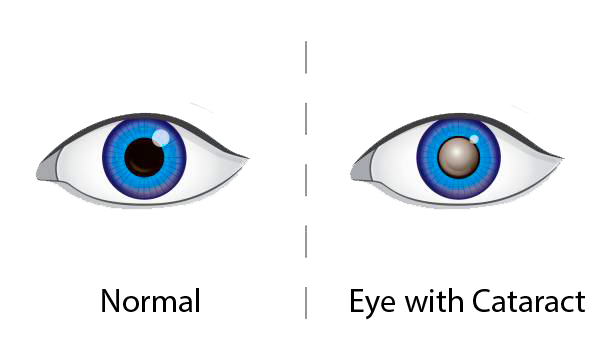
Cataract
WHAT IS A CATARACT?
A cataract is a clouding of the natural lens in the eye. A Cataract is a commonly occurring age-related disorder of the eye which blocks the light from reaching the retina and causes unclear vision. As the cataract progresses, it causes hazy vision and may interfere with your daily activities. Cataracts usually develop between the ages of 60-80.
Patients with cataracts may need to undergo surgery for cataract removal.
AGEING: People older than 60 years of age are at increased risk of getting Cataracts.
EXPOSURE: Overexposure to UV rays can negatively affect the eyes and cause Cataracts.
DRUG INDUCED: One can get Cataracts due to prolonged usage of steroids.
DIABETES: People with diseases like diabetes are more likely to develop a Cataract.TRAUMATIC OR INJURY INDUCED CATARACT: An injury to the eye can cause Cataracts or even complete loss of vision.ALCOHOL ABUSE OR CHAIN-SMOKING.
COMMON QUESTIONS ABOUT CATARACTS
- Double vision or Polyopia (appearance of multiple objects).
- Halos and glare at night.
- Need more light to see clearly
- Increasing nearsightedness
- Rapid need to change eyeglasses prescription in the early stages.
- Cataracts can occur in children. Any white reflex observed in children should be taken seriously. Visit a pediatric ophthalmologist for prompt diagnosis and management. Advanced Eye Specialists doctors can help diagnose and refer you to a pediatric ophthalmologist.
Many people think that cataract has to develop completely before it can be removed, but this is no longer true. Cataract surgery is a safe and predictable procedure that can be performed at any point of time you feel your reduced vision is impacting your day-to-day life.
If left untreated, over a period of time, the clouded areas of the lens can become larger and denser, resulting in worsening of the vision. This could take anywhere between a few months to several years. Eventually, your entire lens can become clouded, leading to a further increase in blurred vision, thus affecting your daily activities.
Yes, usually patients remain fully awake during a cataract surgery.
No single lens works for everyone and your ophthalmologist can determine the most appropriate option for you. However, in general, if you would like to depend less on glasses, ask about our range of multifocal lenses.
The best surgical procedure is one that combines high precision and has the greatest safety margin. Currently, Laser Cataract Surgery and selecting a package where all disposable instrumentation is used is probably the best.
Cataracts can occur in children. Any white reflex observed in children should be taken seriously. Visit a pediatric ophthalmologist for prompt diagnosis and management. Advanced Eye Specialists doctors can help diagnose and refer you to a pediatric ophthalmologist.
Many people think that cataract has to develop completely before it can be removed, but this is no longer true. Cataract surgery is a safe and predictable procedure that can be performed at any point of time you feel your reduced vision is impacting your day-to-day life.
Once a cataract is removed it cannot recur. However, over a period of time, some patients may complain of cloudy vision. This condition is called a secondary cataract and it can be treated by a simple laser procedure.
The overall success rate of a cataract surgery is +98%. Continuous innovation in techniques and instruments has made the procedure simpler and safer than before.
A minimum of seven days rest is recommended before you resume your day-to-day activities. This may vary based on your eye condition and your working environment. A polluted and stressful environment should be avoided.
Cataract surgeries typically last for approximately 15-30 minutes.
As your eyes heal in the days following surgery, you may experience various visual disturbances, such as glare and halos (rings around light sources) in certain lighting conditions. This is normal and usually subsides over time.
Most people notice a significant improvement in their vision and can resume everyday activities within 24 hours after cataract surgery with precautions that have been informed to you after surgery. However, depending on which intraocular lens you have implanted, it can take between two weeks to six months to completely adjust and for you to achieve your optimal vision.
